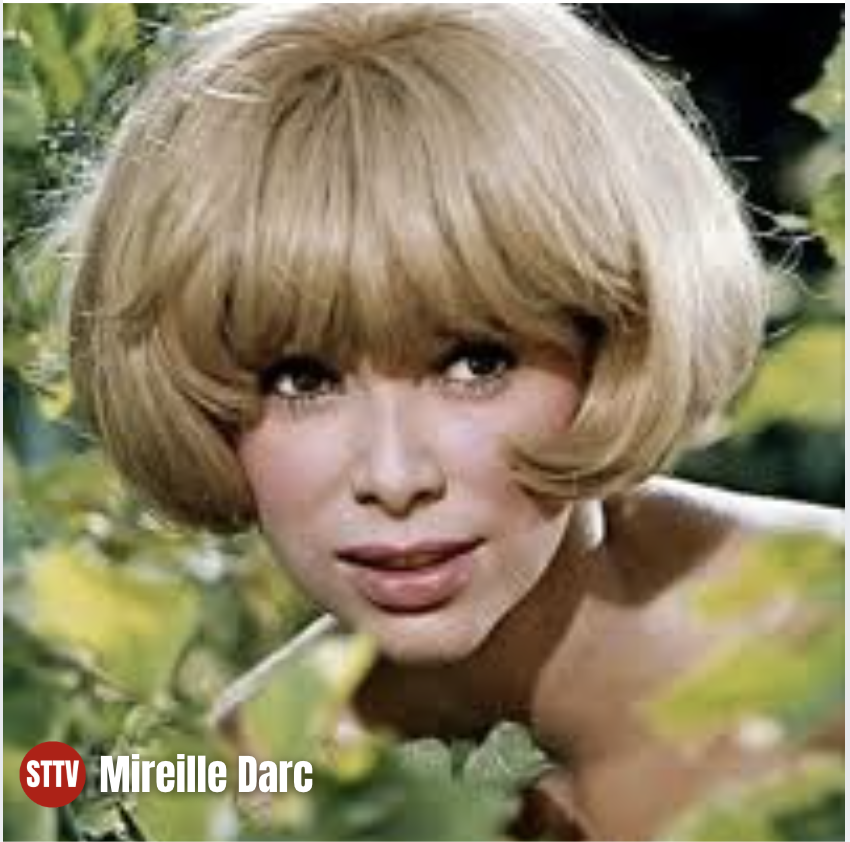In everyone’s life, the time comes to take stock. It seems mine has arrived. Although, at least, I had a reason. Ten years after my mother’s death, I accidentally discovered what was perhaps my greatest secret, the one that poisoned my childhood. It turned out that my father, Marcel, was not my biological father…
The revelation stunned me, and I vividly recalled how lonely I had felt in my own home. Mostly because of the way my parents treated me—my mother never showed me tender feelings, her affection was reserved, almost secretive—now I understand why. But my father… It seemed like he hated me. When passing by, he would always rudely shove me in the back, whisper curses, and often call me a “foundling.”
At that time, I didn’t understand the meaning of the word; I thought it meant something like “naughty girl.” I kept asking myself: what had I done to upset my father so much? Maybe it was all because of my parents’ relationship—I had noticed that they slept in separate rooms, my father was sullenly silent at the table, spending entire days hunched over his garden beds.
I wore the hand-me-downs of my older brothers; there were no concessions for me, even though I was the youngest and a girl. When I got sick, I endured angina and flu on my feet. Years later, this would have a fatal impact on my heart—I developed mitral valve stenosis.
I had no toys. No dolls either. No gifts for birthdays or Christmas. No holidays. And at school, I suffered from the cruelty of the teachers.
My only refuge was the attic—only there, hiding from everyone, did I feel safe. Sounds from the street reached me, the clatter of dishes from the kitchen, the voices of my family—I was, in a way, both with them and apart, behind an invisible protective boundary, in my hiding place.
One day, my father grabbed me roughly by the arm and dragged me up to the attic. I was terrified; before, he had only touched me to scold or mock me, but this time… His face, usually expressionless, was distorted with a grimace of hatred. I obediently followed him.
Finding ourselves in my secret hiding place, my father ordered: “Stand here and watch—I’m going to hang myself right now. Because of you. You have brought me nothing but misery!”
I burst into tears: “Daddy, what have I done wrong? What did I do to you?”
“What did you do? You’ve driven me to this state, I want to die. I will hang myself right before your eyes!”
“No, Papa, don’t! Don’t die! I don’t want you to die! Please…”
Oh God, I was only eight or nine years old…
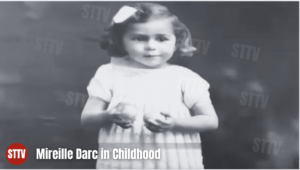
It seems that such an experience only made Mireille stronger, more resilient, and yet did not harden her character. Upon coming of age, she left her childhood home. In Paris, she enrolled in the Conservatory of Dramatic Arts. To pay for her studies, she worked as a waitress, walked dogs, and rented a tiny apartment in a poor district of the city.
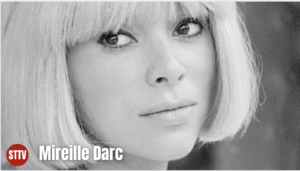
A chance encounter with the popular singer Gilbert Bécaud changed her life. Following his advice, she went to an artistic agency and landed a small role in Bernard Shaw’s play at the Gramont Theatre. More offers soon followed, and she found herself acting alongside Michel Piccoli, Louis de Funès in three films, Jean Gabin, and Lino Ventura, achieving particular success in comedies. Mireille also starred in Galia, a film by Georges Lautner. It was he who insisted that she dye her hair blonde. “The moment I saw myself as a blonde, I realized this was truly me,” the actress later recalled.
Everyone knows about her fateful meeting with Alain Delon on a plane and that their romance began much later, during the filming of Jeff in 1968 in Rome, where they were carefree and happy. And perhaps paradoxically, they truly loved each other.
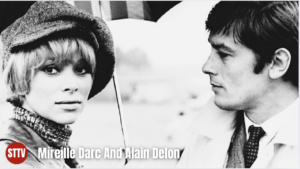
“I was so happy! I kept telling myself: this is not a dream, you are in the most beautiful city in the world, next to the most beautiful man, and for the first time, you are not afraid to love. For the first time, you dream that this feeling has a future. It was incredible. New. Strange. Before, I never wanted to be attached to anyone for long, seeing love only as a fleeting adventure. But with Alain, I suddenly wanted everything—family, a shared home, children.” Mireille Dark later recalled.
Upon returning to Paris, Mireille moved in with Alain, and during this time, she proved her loyalty to him, standing by his side during a difficult period when many turned away from him. This was during the long-running investigation into the murder of Stevan Marković, in which Delon was initially considered a suspect. The case dragged on for nearly seven years. Despite all advice to leave him, Mireille refused to abandon Alain Delon. “It was at that moment that we both realized our feelings were not just an affair but something real. We no longer had to prove anything to each other,” she later said.
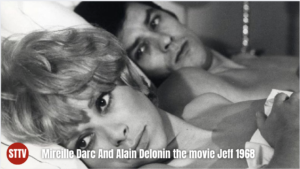
Now, many years after their separation—they parted ways in 1983—I am certain: if there was true love in these actors’ lives, it was for each other. And the paradox is that it was mutual. By some cruel irony, they were never meant to spend their lives together. Undoubtedly, it is a sad story, but such is life. It does not matter how famous or successful you are—life is unpredictable, and in that unpredictability lies both its beauty and its tragedy. But unlike the movies, it does not follow a scripted plot; it unfolds in the harsh reality of the world.



